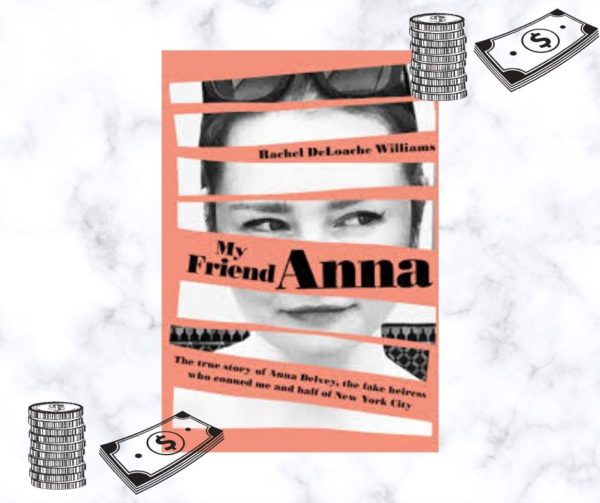You are out with a group of friends, eating dinner or getting a drink. The bill comes along, and a friend offers to get it for the group. You all do this, alternating who pays and sharing the responsibility. With close friends, this is increasingly common. I do this often with my best friend and with my family because, at some point, they will get a check or pick up my coffee. It’s a mutual trust between friends.
Now imagine that you have a friend who doesn’t pay.
It starts with one drink. Then it’s dinner or two (or more). Maybe it’s shared Uber rides that you always pay for; maybe it escalates even further to where you are buying groceries or gas or more.
Has this ever happened to you? If so, you could easily relate to this month’s book, My Friend Anna.
 Rachel DeLoache Williams wrote the book about her friendship with a woman she thought was a German socialite and heiress. But as she (and we) come to find out ourselves, Anna was not who she proclaimed to be.
Rachel DeLoache Williams wrote the book about her friendship with a woman she thought was a German socialite and heiress. But as she (and we) come to find out ourselves, Anna was not who she proclaimed to be.
Rachel, a former Vanity Fair photo editor, met Anna Delvey in 2016 through mutual friends. Anna was in town to start up an art foundation. She was swayed by Anna’s eccentricity and charm; she brushed away her odd behavior, chronic lateness, and disregard for money as a part of her personality. Soon, Rachel and Anna were meeting nearly every day for dinners, drinks, even personal workout sessions.
As I was reading this, I pictured the lavish amounts of money being thrown into all this. Rachel admits that Anna often told her it was “taken care of” or covered costs, and she did in kind. There is that mutual trust we talked about, right?
It sounded like a great friendship – until a disastrous trip to Morrocco.
Anna invited Rachel and two other acquaintances on an all-expense-paid trip to Marrakech. It was to be a working trip for Anna, and Rachel was going to head to France on a solo trip. They landed and were whisked away to a private villa at La Mamounia hotel, a 5-star resort and the epitome of luxury. What is not to love: a gorgeous location, a free vacation, and 5-star accommodations – all for free?
But things swiftly went sour.
Anna’s credit cards mysteriously stopped working. She brushed it off as a minor issue with her bank. She was using a foreign bank, and she explained that there was a hold up with the money from her trust fund. The hotel was not quite as understanding and asked for a card to place a hold for the resort. Rachel let the hotel use her card, with the caveat that this was just a hold and not an actual charge.
Must to her consternation, Rachel found out that the hotel charged her personal and business credit cards for the entire bill – $62,000.
Anna reassured her that she would be repaid over and over again, but this never happened. The latter half of the book exposes the weeks and months of anguish and stress that Rachel endured. There were text messages and emails with varying excuses and reasons. But the money was never repaid.
This seems like an unimaginable situation because it was. How did this happen?
A few of our readers felt like there were red flags about Anna even before the trip. They felt like Rachel was blinded by Anna because she was having fun. Melanie commented, “In the back of her mind she had to have known something was up and that Anna was not totally trustworthy. She was just enjoying herself too much and looked past it.”
Lorren pointed out that she could never have accepted the free trip. “I would just feel really uncomfortable letting someone pay my way (or not as the case turned out).” And let’s be honest: most of us cannot fathom a vacation that costs over $60,000 let alone having someone pay for it! We empathized with the author, but it also felt slightly avoidable.
Part of Anna’s con is that everyone thought they knew her so well. She was enigmatic and gained followers who all knew parts of her life and her story. She was able to con each of these people into believing whichever story she fed them – and into paying for her lavish lifestyle without realizing it.
It left us wondering – how did anyone fall for this?
But that is the advantage of reading this story from an outside perspective. We can guess how we would react or feel, but we will never know. Rachel was the person living it; dealing with the fallout and the financial implications; going to trial; learning that her supposed friend was not who she thought she was.
This true story does not end with the book.
The tabloids and news media outlets loved this story. The real Anna Delvey was charged with grand larceny and sentenced to four to twelve years in prison.
Rachel DeLoache Williams was eventually reimbursed for the charges to her credit cards, but not without months of argument, anguish, and fear. She was featured in Vanity Fair for this story; she secured this book deal as well as options from HBO and Netflix for the rights to her story.
But the real takeaway from this tale of deception? No one knew the real Anna Delvey.






 Come back next month as we read
Come back next month as we read 







